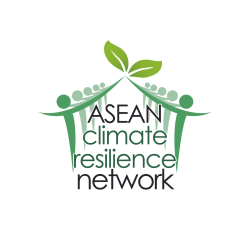ASEAN Climate Resilience Network (ASEAN-CRN)

ASEAN Climate Resilience Network (ASEAN-CRN)
The ASEAN Climate Resilience Network (ASEAN-CRN) is a platform for regional exchange of information, experiences and expertise on climate-smart land use. The network facilitates the translation of science into policies and finds resources to support needs of the sector within the region.
Background
Agriculture and food security are highly vulnerable to climate change impacts. As a region that relies heavily on agriculture and natural resources, member states of the Association of Southeast Asian Nations (ASEAN) face the recurrent challenge of addressing climate change impacts to ensure food security for a growing population.
Recognising the need for regional cooperation on agriculture and food security under climate change, the ASEAN Technical Working Group on Agricultural Research and Development (ATWGARD) initiated a project on the Promotion of Climate Resilience in Rice and Other Crops. Led by Thailand, in 2014 this initiative developed into the ASEAN-CRN, which addresses the need for regional cooperation on agriculture and food security in facing climate change.
Objective
The aim of the ASEAN-CRN is to ensure that ASEAN Member States are in a better position to adapt their land use sectors to climate change and to optimize its mitigation potential. The network also promotes climate resilience and low emissions through a series of dynamic knowledge exchange events and collaborative initiatives. In doing so, the ASEAN-CRN actively engages with relevant stakeholders and projects in the region, and is a member of the Global Alliance for Climate Smart Agriculture (GACSA) and the Asia Pacific Adaptation Network (APAN).
Our Work Areas
Key Achievements
Since its formation, the ASEAN-CRN has significantly advanced the agenda of agriculture and climate change in ASEAN. The intensified cooperation on the topic resulted in:
- National studies assessing the vulnerability of food crops as well as existing practices and efforts to promote resilience in participating member states
- Documentation of results in seven national studies for each of the participating AMS and combined in the book on Promotion of Resilience for Food Security in ASEAN
- Prioritization of CSA practices for regional cooperation as documented in the book on Promotion of Climate Resilience for Food Security in ASEAN
- Endorsement by ASEAN Ministers of Agriculture and Forestry (AMAF) of the ASEAN Regional Guidelines for Promoting CSA Practice
- Collaborative development of project proposals to access climate funds for the scaling-up of CSA in the region
- Technical submissions on topics related to agriculture and to climate change to the United Nations Framework Convention on Climate Change (UNFCCC)
- Formation of the ASEAN Negotiation Group for Agriculture (ANGA), endorsed by AMAF
Approaches
The network links scientific institutions and development agencies to policy-makers, and provides a platform for dialogue between relevant stakeholders at national, regional and international level. Through the network, the ASEAN Member States:
- Engage in dialogue among each other to develop joint ASEAN positions on climate change and land use in regional and international forums
- Promote climate-smart land use practices in agriculture and forestry that are aligned with national priorities and policies
- Receive technical support and capacity building for land-use and climate change
Partners
The network engages relevant ASEAN bodies, research institutions and CSA experts who share experiences, pilot test their data and document their findings in collaboration with members of the ASEAN-CRN.
The ASEAN CRN is currently supported by the ASEAN-German Cooperation Project, “Promotion of Sustainable Agricultural Value Chains in ASEAN” (ASEAN AgriTrade), implemented by Deutsche Gesellschaft für Internationale Zusammenarbeit (GIZ) GmbH; Food and Agriculture Organization of the United Nations – Regional Office for Asia and the Pacific (FAO-RAP); and Mekong Institute (MI) on behalf of the ASEAN AgriTrade Project, in close cooperation with ASEAN Secretariat (ASEC).
For more information, visit: www.asean-crn.org/





